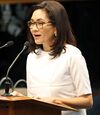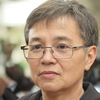Sanama general election, 1697: Difference between revisions
No edit summary |
|||
| Line 97: | Line 97: | ||
== External events == | == External events == | ||
As the failure to find enough support for a Chancellor caused the process to drag on for months, the Peoples' Front agitated forcefully in the streets, online and in the media for a Socialist state under their stewardship. The main argument was that a corrupt bourgeoisie had rigged the election to deprive the people of their democratic rights. Most people were susceptible to this argument since it was illogical for the alliance with the most votes to not get the most seats. | As the failure to find enough support for a Chancellor caused the process to drag on for months, the Peoples' Front agitated forcefully in the streets, online and in the media for a Socialist state under their stewardship. The main argument was that a corrupt bourgeoisie had rigged the election to deprive the people of their democratic rights. Most people were susceptible to this argument since it was illogical for the alliance with the most votes to not get the most seats. The election also coincided with the economic chaos brought on by falling oil prices and exports, rising prices for staples such as rice, the social upheaval after ''The Scouring'', and a general growing discontent with the direction of the country. The ''[[Rice Riots of 1697|Rice Riots]]'' broke out on 3.XIII.1697, caused by sharply increased rice prices caused by supply route issues. Starting in Awhara in southwestern Sanilla, the riots quickly spread to many other smaller cities. It also spread to Niyi and Fatehpur Sikri, where the riots took on a different dimension. Orchestrated by the Peoples' Front, the riots also became a vehicle for Communist agitation and labour grievances. The sharp cuts to the military since 1694 had left many servicemembers unemployed. This had also had a cascading effect through the civilian-military supply network, leading to massive layoffs in supporting industries. Even automotive powerhouse [[Faca Automotive Group|Faca]] was hit hard by the economic downturn. | ||
== Electoral districts == | == Electoral districts == | ||
Revision as of 08:36, 1 July 2021
| |||||||||||||||||||||||||||||||||||||||||||||||||||||||||||||||||||||||||||
All 639 seats of the Llusan 320 seats needed for a majority | |||||||||||||||||||||||||||||||||||||||||||||||||||||||||||||||||||||||||||
|---|---|---|---|---|---|---|---|---|---|---|---|---|---|---|---|---|---|---|---|---|---|---|---|---|---|---|---|---|---|---|---|---|---|---|---|---|---|---|---|---|---|---|---|---|---|---|---|---|---|---|---|---|---|---|---|---|---|---|---|---|---|---|---|---|---|---|---|---|---|---|---|---|---|---|---|
| Turnout | 79,663,020 (86.29%) | ||||||||||||||||||||||||||||||||||||||||||||||||||||||||||||||||||||||||||
|
| |||||||||||||||||||||||||||||||||||||||||||||||||||||||||||||||||||||||||||
| |||||||||||||||||||||||||||||||||||||||||||||||||||||||||||||||||||||||||||
The Sanama general election, 1697 is the seventh general election and seventh election to the Llusan. It is also the fifth election to feature electoral districts as well as a majority bonus for the winning alliance of parties. The three coalitions are the governing center-right Alliance for Prosperity, the center-left Democratic League and the far left Peoples' Front. Before the election the Regionalist Bloc collapsed and the Northern League and Partito Popolare Cisamarrese went into the election as separate parties. The election is also the first since the presidency was abolished. It will instead be incumbent on the Speaker to propose a candidate for Chancellor to the Llusan.
The Sanaman economy in 1696 and 1697 was in what can only be described as in freefall. The Scouring during the Second Elwynnese Civil War caused turmoil on the financial markets, large migration from the affected areas to other parts of the Raspur Pact, and an upheaval in the political system. During the build-up to the election, a new alliance was formed. The Peoples' Front, composed primarily of the breakaway Sanaman Liberation Front (revolutionary), the old radical wing of the Sanaman Liberation Front, the Sanaman Communist Party and the radicalised So Sara Alliance / Yardistani List, became a serious contender during 1697. With widespread discontent with the policies of the ruling Alliance for Prosperity, as well as rapidly increasing unemployment, falling wages and rising prices, the Peoples' Front capitalised massively. With the two larger parties organising farmers, the unemployed, day workers and other disadvantaged people across Sanilla and Amarra, the So Sara Alliance and Thanatossian Socialist Workers' Party organised the masses in their respective areas. The stated goal was to take control of the state and govern according to the interests and will of the workers and farmers, to nationalise important industries, regulate prices and provide everyone with work and a living wage.
The electoral result was highly controversial. Due to the amended electoral code, both parties and alliances had to get at least five percent of the national vote to get seats in the Llusan. The highly fractured Peoples' Front technically got the most votes with 36 percent, but as several of the member parties failed to pass the threshold, the alliance only got 29 percent of the directly elected seats, and 26 percent of the total seats. This led to the ruling Alliance for Prosperity gaining a plurality of seats and thereby also getting the majority bonus of 65 seats. However, the loss of 91 seats meant that there was no clear winner of the election. With the leftward drift of the Partito Popolare Cisamarrese, the leftist parties had a majority in the Llusan. However, the Democratic League consisting of the rest of the SLF and C60 refused to cooperate with the Peoples' Front or support their candidate for Chancellor, and the Peoples' Front demanded the Chancellorship for any discussion of a deal to take place.
Government formation
Under the new constitution, the Speaker was responsible for finding a candidate for Chancellor. Shortly after the convocation of the new Llusan, sitting Chancellor Keysa Nur Pinito Caprici was deposed in a vote of no confidence supported by the Peoples' Front, Democratic League and Partito Popolare Cisamarrese. However, the Council of State remained in a caretaker capacity. Given the leftist majority in the Llusan, the Speaker first approached the Peoples' Front to form a majority government. However, those talks broke down when the DL refused to cooperate with or support the PF. The Speaker then approached the caretaker Chancellor Nur Pinito Caprici, who after several days of pressure on the Northern League and PPC reported that she also had failed to form a majority government. The following attempts by the Speaker to find plurality support for a Chancellor ultimately failed when the right wing parties blocked the left wing candidate, and a group of dissenters within the NL and PPC blocked Nur Pinito Caprici. One or more parties needed to change positions for a government to be able to form. Instead the process dragged out for months.
External events
As the failure to find enough support for a Chancellor caused the process to drag on for months, the Peoples' Front agitated forcefully in the streets, online and in the media for a Socialist state under their stewardship. The main argument was that a corrupt bourgeoisie had rigged the election to deprive the people of their democratic rights. Most people were susceptible to this argument since it was illogical for the alliance with the most votes to not get the most seats. The election also coincided with the economic chaos brought on by falling oil prices and exports, rising prices for staples such as rice, the social upheaval after The Scouring, and a general growing discontent with the direction of the country. The Rice Riots broke out on 3.XIII.1697, caused by sharply increased rice prices caused by supply route issues. Starting in Awhara in southwestern Sanilla, the riots quickly spread to many other smaller cities. It also spread to Niyi and Fatehpur Sikri, where the riots took on a different dimension. Orchestrated by the Peoples' Front, the riots also became a vehicle for Communist agitation and labour grievances. The sharp cuts to the military since 1694 had left many servicemembers unemployed. This had also had a cascading effect through the civilian-military supply network, leading to massive layoffs in supporting industries. Even automotive powerhouse Faca was hit hard by the economic downturn.
Electoral districts
| District | Seats |
|---|---|
| Amarra Esa | 23 |
| Cisamarra | 32 |
| Enosa | 27 |
| Fatehpur Sikri | 52 |
| Highpass | 9 |
| Indipendensa | 32 |
| Lagunas | 25 |
| Lamika | 23 |
| National Capital District | 2 |
| Niyi | 90 |
| Qalit | 37 |
| Semisa | 28 |
| So Sara | 33 |
| Thanatos | 54 |
| Thanidor | 25 |
| Tikano | 31 |
| Xawakalë | 25 |
| Xolaso | 26 |
Results
| ||||||||||||||||||||||||||||||||||||||||||||||||||||||||


